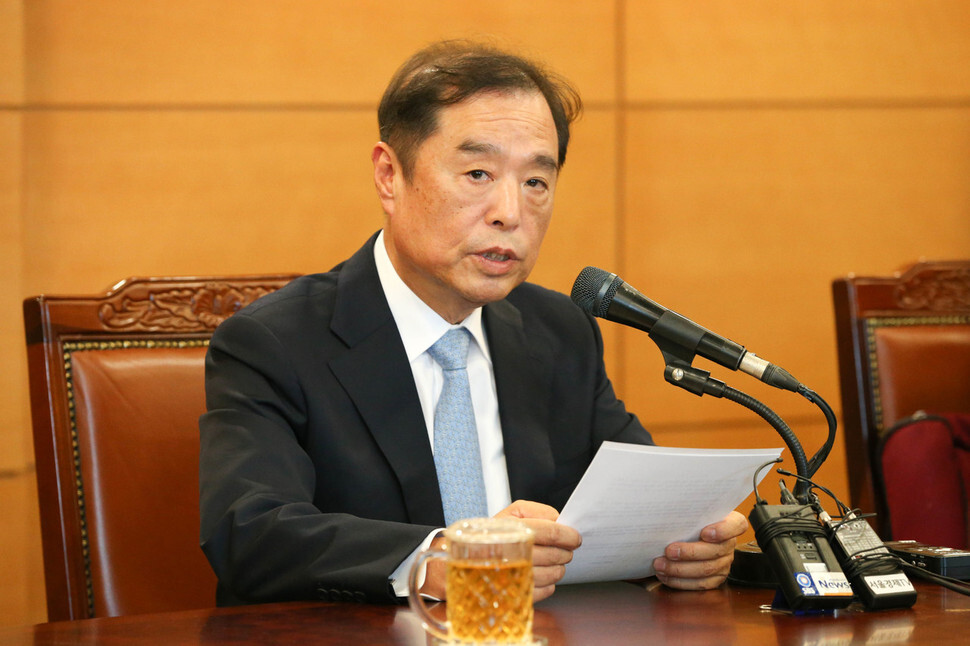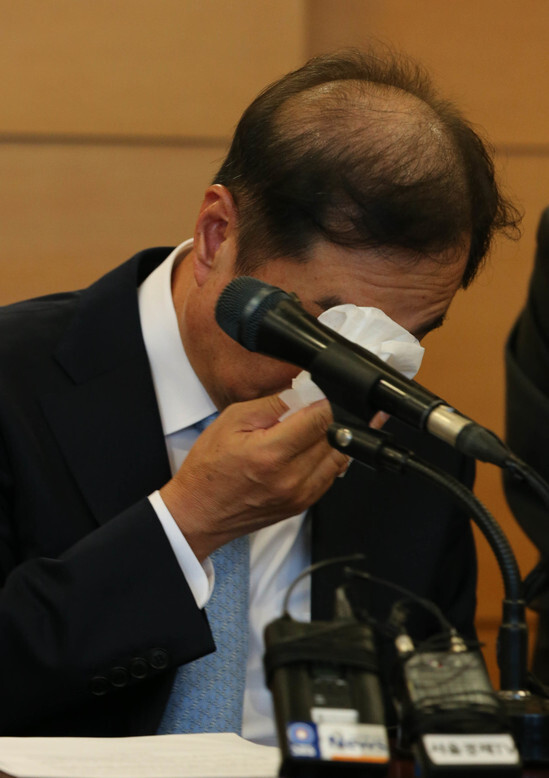hankyoreh
Links to other country sites 다른 나라 사이트 링크
PM nominee declares he will be delegated economic and social policies and “do a good job”

“I will exercise all the powers of the prime minister as outlined in the Constitution, and I will ask [President Park] to delegate economic and social policies to me,” said Kim Byong-joon, who has been nominated as prime minister of South Korea, on Nov. 3. While Kim has effectively declared that he will be a “responsible prime minister” who takes charge of domestic affairs (that is, all but foreign affairs and security policy), some allege that Kim may not be able to keep this promise considering that Park has not explicitly ceded those powers to Kim. Regardless of Kim’s plans for running the country, the opposition parties are strongly opposed to accepting a reshuffle of the cabinet made in disregard of the National Assembly, making it uncertain whether the National Assembly will confirm Kim as prime minister.
On Nov. 3, Kim held a press conference at the research institute of the Financial Supervisory Service in Seoul. “Last Saturday [Oct. 29], I met President Park and talked with her for quite a long time. I told her that I would like to take over economic and social policies, since those are the areas I can do a good job on,” Kim said during the conference, adding that he thought that Park had agreed to this idea.
“The powers of the prime minister as outlined in the Constitution are very simple. The prime minister is to supervise the affairs of state, following the instructions of the president, and to exercise the powers of appointing members of the cabinet and calling for their dismissal,” Kim said when asked about the scope of the prime minister’s authority.
“I interpret ‘supervising the affairs of state’ broadly as meaning that the prime minister exercises control over all matters of economic and social policy,” Kim said, making clear that he intends to take charge of the government. “I will carry out all matters, including reshuffling the cabinet, in deliberation with the National Assembly and with both the ruling and opposition parties. In that process, a neutral cabinet will be formed, though no doubt it won’t be perfect.”

But there is already discord even inside the Blue House about the prime minister’s authority and about the scope of his role. When Senior Secretary for Personnel Affairs Jung Jin-cheol was asked about the authority of a “responsible prime minister” during an appearance before the National Assembly’s Special Committee on Budget and Accounts on Nov. 4, Jung said, “Media reports are suggesting that the prime minister could take charge of domestic affairs while the president remains in control of foreign affairs, but I don’t think that that’s possible under the current Constitution.”
This basically contradicted comments made the previous day by a high-ranking official in the Blue House who said on condition of anonymity that Park would relinquish effective control and that Kim would serve as a “responsible prime minister.” “I assume that Park and the new prime minister will discuss how to share their responsibilities. Considering the gravity of the situation, what I’m guessing is that the new prime minister will be able to basically run the cabinet to a significant extent,” Jung said.
Under South Korea’s current constitution, power is concentrated in the president, and the role of the prime minister is extremely limited. As an inevitable consequence, there is no legal basis for a responsible prime minister system, and this depends on how much authority the president actually delegates to the prime minister.
The reason that Prime Minister Lee Hae-chan was called a responsible prime minister (or powerful prime minister) during the administration of former president Roh Moo-hyun (2003-2008) was that Roh backed this up by carrying out his promise to delegate a wide range of powers to the prime minister, such as the ability to preside over cabinet meetings and the authority to make policy decisions. That’s why Kim’s bold statements about the powers of the prime minister sound so hollow, given that Park has not come forward with a clear plan for running the country or for changing her policy framework.
The opposition parties are still firmly opposed to moving forward with a confirmation hearing for Kim. “The three opposition parties have already agreed to block [Kim’s] confirmation regardless of his character, qualifications and positions. The opposition parties’ position will not change regardless of what Kim says,” said opposition Minjoo Party Floor Leader Woo Sang-ho.
“We’re talking about vetoing Park’s nominee for prime minister, since she made the nomination without either leaving the Saenuri Party or deliberating her choice with the leaders of the ruling and opposition parties,” said People's Party Emergency Committee Chair and Floor Leader Park Jie-won in a meeting with reporters.
By Jung In-hwan, Song Kyung-hwa and Choi Hye-jung, staff reporters
Please direct questions or comments to [english@hani.co.kr]

Editorial・opinion
![[Column] Has Korea, too, crossed the Rubicon on China? [Column] Has Korea, too, crossed the Rubicon on China?](https://flexible.img.hani.co.kr/flexible/normal/500/300/imgdb/original/2024/0419/9317135153409185.jpg) [Column] Has Korea, too, crossed the Rubicon on China?
[Column] Has Korea, too, crossed the Rubicon on China?![[Correspondent’s column] In Japan’s alliance with US, echoes of its past alliances with UK [Correspondent’s column] In Japan’s alliance with US, echoes of its past alliances with UK](https://flexible.img.hani.co.kr/flexible/normal/500/300/imgdb/original/2024/0419/2317135166563519.jpg) [Correspondent’s column] In Japan’s alliance with US, echoes of its past alliances with UK
[Correspondent’s column] In Japan’s alliance with US, echoes of its past alliances with UK- [Editorial] Does Yoon think the Korean public is wrong?
- [Editorial] As it bolsters its alliance with US, Japan must be accountable for past
- [Guest essay] Amending the Constitution is Yoon’s key to leaving office in public’s good graces
- [Editorial] 10 years on, lessons of Sewol tragedy must never be forgotten
- [Column] A death blow to Korea’s prosecutor politics
- [Correspondent’s column] The US and the end of Japanese pacifism
- [Guest essay] How Korea turned its trainee doctors into monsters
- [Guest essay] As someone who helped forge Seoul-Moscow ties, their status today troubles me
Most viewed articles
- 1[Column] The clock is ticking for Korea’s first lady
- 2Hong Se-hwa, voice for tolerance whose memoir of exile touched a chord, dies at 76
- 3[Column] Has Korea, too, crossed the Rubicon on China?
- 4After 2 months of delayed, denied medical care, Koreans worry worst may be yet to come
- 5[Correspondent’s column] In Japan’s alliance with US, echoes of its past alliances with UK
- 6All eyes on Xiaomi after it pulls off EV that Apple couldn’t
- 7[Photo] Smile ambassador, you’re on camera
- 8US overtakes China as Korea’s top export market, prompting trade sanction jitters
- 9S. Korea “monitoring developments” after report of secret Chinese police station in Seoul
- 1075% of younger S. Koreans want to leave country